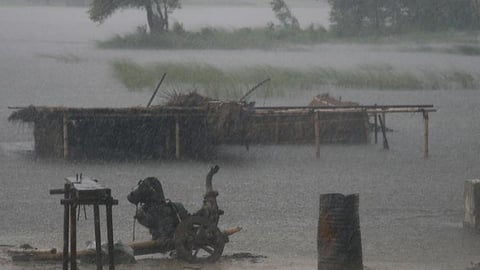
- Topics
- Feature
- Opportunities & Events
- Data
- Hindi Portal
- Topics
- Feature
- Opportunities & Events
- Data
- Hindi Portal

A cyclonic storm Daye made its landfall in Odisha on September 21. Although the tropical storm had weakened into a deep depression soon after making landfall, the wind pattern has changed triggering rainfall in Punjab, Haryana, Uttar Pradesh and Delhi-NCR. The untimely rainfall coincides with the harvesting time of paddy crops in the states. The fear of a large-scale crop damage looms large in Punjab and Haryana. The incessant rain is also causing havoc in Himachal Pradesh. The water level in the Himachal’s Pong dam is nearing the danger mark and the administration has decided to release 49,000 cusecs of water from the dam.
The expert committee constituted by the Centre has identified 11 hotspots with alarming silt deposits in the Ganga river in Bihar. The committee has highlighted the need to remove the silt so as to minimise flood risk in the region and clear way for the national waterway project. The report, which has been submitted to the central water resource department, has stressed for a more in-depth study of morphological changes in the Ganga from Buxar in Bihar to Farakka in West Bengal. The report findings have come as a good news to the Bihar government which has been repeatedly pressurising the central government to deal with the issue over the past three years.
The state government has submitted the proposal to the National Board For Wildlife to denotify the entire ‘Kachhua’ or Turtle Wildlife Sanctuary in Varanasi. The Wildlife Institute of India has prepared the report for denotifying the 210-hectare-area of the sanctuary. The report has used the presence of fewer species of turtles in the sanctuary as a justification to denotify it. However, the underlying reason for this destruction is that the sanctuary is coming in the way of the Centre's mega plan of a 1,620-km-long national waterways project. If the Centre agrees to the proposal, this will be the first time since the inception of the Wildlife Protection Act, 1972 that a sanctuary is getting wiped off the map of India completely.
The Geological Survey of India in partnership with the Darjeeling district administration has deployed the People-centric Landslide Early Warning System (L-EWS) in the landslide-prone Giddapahar, a small hamlet in the Darjeeling Himalayas. The system relies on monitoring of rainfall and analysis of rainfall threshold value and exceedance by community members that are then shared with the administration for timely action. The low-cost system has been launched on an experimental basis and empowers the community to manage landslide hazards.
Over 1,000 Gujarat farmers have written to the Japan International Cooperation Agency (JICA) requesting to withhold disbursal of funds for the Mumbai-Ahmedabad Bullet train. Nearly, 1,400 hectares of land will be acquired in Gujarat and Maharashtra for the project, of which 1,120 hectares is privately owned. The farmers have alleged violation of guidelines in the agreement signed between the Japan and Indian governments. As per the farmers, no committee has been formed for the environmental and social impact assessment of the project and the assessment reports for the project date back to 2010.
This is a roundup of important news published between September 19 - 25, 2018. Also read policy matters this week.